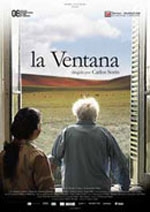
-

La ventana de Carlos Sorín, una sutil reflexión sobre el paso del tiempoPor John Anderson
La ventana de Carlos Sorín resulta tan elegante en la manera de narrar como lo es la historia misma que nos cuenta; una fábula sobre el envejecimiento y la muerte que evita todos los clichés típicos del cine dedicado a personas de la tercera edad. La ventana, por el contrario esta teñida de una rica veta de melancolía y humor a partes iguales. La película representa el regreso a Patagonia del director argentino (Bombon: el perro, 2004).
A pesar de todos estos valores las posibilidades del filme de penetrar en el mercado internacional de películas de habla no inglesa son las mismas de cualquier otra película del área.
Si esta perspectiva no es muy optimista se debe a que gran parte del arte y el encanto de esta película hay que descubrirlo y leerlo entre líneas. La ventana es un filme que exige del espectador una participación activa, que no sea contemplado como una mera experiencia pasiva.
Con un sentido de su tiempo y lugar casi palpable -en este caso el entorno de una familia particular- Sorín nos cuenta una historia de nostalgia y arrepentimiento, dos elementos que considera indisolubles. Un argentino aristocrático, Antonio (Antonio Larreta) espera el regreso largamente ansiado de su hijo Pablo (Jorge Diez), un pianista de clase mundial. Asistido y servido por sus dos fieles sirvientas (Maria del Carmen Jimenez, Emilse Roldan), Antonio no hace nada por si mismo para preparar el recibimiento de su hijo, solo da ordenes: El viejo piano debe ser afinado; hay que sacar la botella de champagne con 40 años de añejo. uno de los momentos más reveladores es cuando Antonio saca la llave del gabinete del bolsillo de su piyama. Nos vamos gradualmente explicando porque el hijo se marchó del hogar.
En este filme nada es evidente, el afinador del piano (magníficamente interpretado por Roberto Rovira, con su apariencia de sátiro) proporciona una banda sonora de notas fracturadas, mientras las mujeres trabajan y los hombres reflexionan. Antonio finalmente “se escapa” -decide dar una caminata por la hacienda- la crisis que se desata incorpora al filme la energía juvenil que resalta y hace aún más dramático el debilitamiento de Antonio y su mansión.
Sorín ha construido un poema reflexivo, que nunca resulta solemne, siempre penetrante y en ocasiones incluso hilarante. Cuando Pablo llega finalmente, el cordón umbilical de su esposa Claudia con el mundo (Carla Peterson), el teléfono celular, sirve para sugirirnos que quizás Antonio vive en un mundo mejor que el nuestro. Este es un momento apenas efímero del filme pero que sobrevuela todo el filme. La ventana
La ventana
By John Anderson
As elegant in its storytelling as in its story, Carlos Sorin's L Vetana (The Window) is a tale of age and mortality that firmly resists the "cute" tag reflexively assigned to movies with old people, and mines a rich, deep vein of melancholy and humor. Marking a return to Patagonia for the Argentine helmer (Bombon: el perro, 2004), The Window will have as good a chance at cracking the hard-shell foreign-language market as any other film this year.
If that doesn't seem to ring with hope and optimism, it's because The Window would have as tough time in American theaters in English as it will in Spanish, given that so much of its charm and art are between the lines. It's a film that needs to be actively watched, not passively experienced.
With an almost palpable sense of place -- and more importantly, a particular household -- Sorin tells a story of remembrance and regret, two things he sees as inseparable. Eightysomething Argentine aristocrat Antonio (Antonio Larreta) is awaiting the return of his long-absent son, Pablo (Jorge Diez), a world-class pianist.
Bedridden, waited on hand-and-foot by his two faithful housekeepers (Maria del Carmen Jimenez, Emilse Roldan), Antonio can do nothing himself about the preparations for his son. But he dictates from beneath the sheets: The decrepit piano must be tuned; the 40-year-old bottle of champagne must be retrieved. (One of the film's most revealing, and characteristic, gestures is Antonio's pulling the liquor cabinet key from his pajama pocket.) We get a sense of why Pablo went away.
Almost nothing is overt in The Window. The piano tuner (played by the wonderfully satyr-like Roberto Rovira) provides a soundtrack of fractured notes as the women bustle and the lord of the manor reflects. Antonio eventually "escapes" -- he decides to take a walk around the hacienda -- and the crisis that ensues brings youth and energy into the movie in a way that makes the enfeeblement of Antonio and his mansion all the more poignant.
Sorin has constructed a reflective poem, one that's never solemn, always insightful and sometimes hilarious. When Pablo finally arrives, the umbilical attachment of his wife, Claudia (Carla Peterson), to her cell phone is the one suggestion that perhaps Antonio lives in a better world than us. It's an ephemeral moment, but it lingers. Production values are just fine.
(Fuente: Variety)

